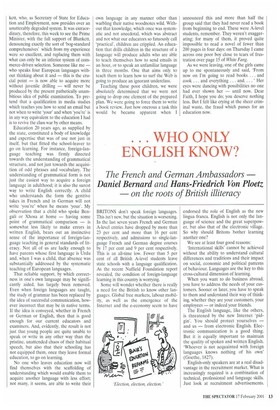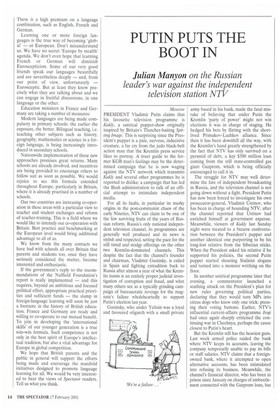. . WHO ONLY . ENGLISH KNOW?
The French and German Ambassadors — Daniel Bernard and Hans-Friedrich Von Ploetz — on the roots of British illiteracy BRITONS don't speak foreign languages. This isn't new, but the situation is worsening. In the last seven years French and German A-level entries have dropped by more than 23 per cent and more than 16 per cent respectively, and admissions to single-language French and German degree courses by 17 per cent and 9 per cent respectively. This is an all-time low. Fewer than 5 per cent of all British A-level students leave state schools with a language qualification. As the recent Nuffield Foundation report revealed, the condition of foreign-language learning in this country is worrying.
Some will wonder whether there is really a need for the British to know other languages. Global free markets, labour mobility, as well as the emergence of the Internet and the e-economy seem to have endorsed the role of English as the new lingua franca. English is not only the language of science and the great superpower, but also that of the electronic village. So why should Britons bother learning another one?
We see at least four good reasons: 'International skills' cannot be achieved without the ability to understand cultural differences and traditions and their impact on social, economic and political patterns of behaviour. Languages are the key to this cross-cultural dimension of learning.
When you want to do business abroad, you have to address the needs of your customers. Sooner or later, you have to speak to them and understand their way of thinking, whether they are your customers, your employees — or indeed your friends.
The English language, like the others, is threatened by the new Internet 'pidgin'. You should protect yourselves — and us — from electronic English. Electronic communication is a good thing. But it is equally important to maintain the quality of spoken and written English. 'Whoever is not acquainted with foreign languages knows nothing of his own' (Goethe, 1827).
English-only speakers are at a real disadvantage in the recruitment market. What is increasingly required is a combination of technical, professional and language skills. Just look at recruitment advertisements.
There is a high premium on a language combination, such as English, French and German.
Learning one or more foreign languages is the true way of becoming 'global' — or European. Don't misunderstand us. We have no secret 'Europe by stealth' agenda. We don't even hope that learning French or German will diminish Euroscepticism. Some of our very good friends speak our languages beautifully and are nevertheless deeply — and, from our point of view. unfortunately — Eurosceptic. But at least they know precisely what they are talking about and we can engage in fruitful discussions, in one language or the other.
Education ministers in France and Germany are taking a number of measures: Modern languages are being made compulsory in primary schools: the earlier the exposure, the better. Bilingual teaching, i.e. teaching other subjects such as history, geography, mathematics or science in a foreign language, is being increasingly introduced in secondary schools.
Nationwide implementation of these new approaches promises great returns. Many schools are already involved, and incentives are being provided to encourage others to follow suit as soon as possible. We would rejoice to see this formula extended throughout Europe, particularly in Britain, where it is already practised in a number of schools.
Our two countries are increasing co-operation in these areas with a particular view to teacher and student exchanges and reform of teacher-training. This is a field where we would like to intensify our co-operation with Britain. Best practice and benchmarking at the European level would bring additional advantage to all of us.
We know from the many contacts we have had with schools all over Britain that parents and students too, once they have seriously considered the matter, become interested and enthusiastic.
If the government's reply to the recommendations of the Nuffield Foundation's report is really implemented — and this requires, beyond an ambitious and focused political effort, appropriate practical priorities and sufficient funds — the slump in foreign-language learning will soon be just a footnote in the history of British education. France and Germany are ready and willing to co-operate to our mutual benefit. To join in developing the 'international skills' of our younger generation is a true win-win formula. Such competence is not only in the best spirit of Europe's intellectual tradition, but also a vital advantage for Europe in global competition.
We hope that British parents and the public in general will support the efforts being made and encourage the manifold initiatives designed to promote language learning for all. We would be very interested to hear the views of Spectator readers. Tell us what you think.



































































 Previous page
Previous page